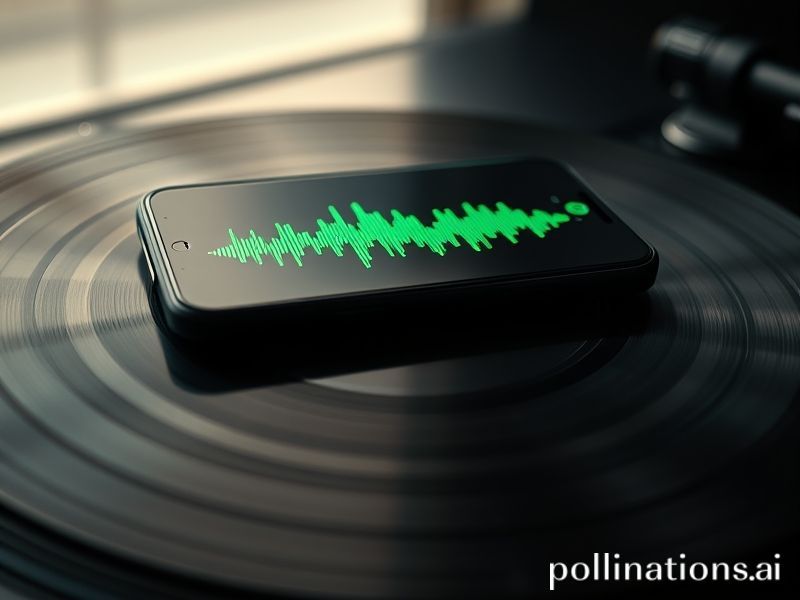Lossless Spotify Goes Global: High-Resolution Audio for the End of the World
Lossless Spotify: When the Planet Burns, but at Least the Cymbals Sparkle
By Dave’s International Bureau of First-World Problems
ZURICH—In a world where the Arctic is auditioning for a slush-puppy commercial and democracy comes with optional subtitles, Spotify has finally rolled out lossless audio to 180 countries. The feature—marketed as “HiFi” because “We Found Another Way to Charge You” tested poorly—promises CD-quality streams at 1,411 kbps. That’s roughly 3.5 times the data of the compressed mush we’ve been humming along to while our cities install traffic lights for e-scooters.
Reaction was predictably bipolar. Audiophiles from Oslo to Osaka wept into their $900 balanced cables, grateful that the ghost of Miles Davis can now haunt their AirPods Max without sounding like he’s gargling gravel. Meanwhile, subscribers in Lagos and Lahore glanced at their data caps and concluded that lossless is a luxury roughly as practical as refrigerated yacht parking. Spotify, ever the egalitarian, helpfully reminds them they can “download over Wi-Fi,” apparently assuming everyone has fiber to the yurt.
Global inequality, now with better transients
The timing is exquisite. As Sri Lanka sorts its economy via QR code and Lebanon’s central bank suggests bartering Spotify gift cards for insulin, the planet’s most urgent upgrade is apparently crisper hi-hats. Analysts at Credit Suisse estimate the rollout will add 0.3% to global data-center emissions—roughly the carbon footprint of Iceland, give or take a volcano. Spotify offsets this by purchasing “renewable energy certificates,” a financial instrument as tangible as a playlist titled “Songs to Freeze to Death To.”
In Berlin, eco-conscious users are already conflicted. “I bike to work, compost my ex-boyfriends, yet here I am streaming 24-bit Billie Eilish like a capitalist war criminal,” sighs Katja, 29, sipping a €9 oat-milk cortado. Her Korean counterpart, Min-jun, simply set his phone to 128 kbps and invested the savings in bitcoin—because irony is the only currency still appreciating.
Geopolitics in 4-4 time
The launch also doubles as soft power karaoke. By pushing HiFi everywhere from Montevideo to Ulaanbaatar, Spotify plants its green-black flag deeper into markets where Tencent, Deezer, and local insurgents fight for ear-share. The European Commission, still sore that Apple gets all the antitrust headlines, is probing whether lossless constitutes a “new technical barrier to entry.” Translation: Brussels wants to make sure French start-ups can still sell distorted accordion loops without buying server farms in Finland.
Russia, naturally, is absent from the party. Muscovites who once streamed dissident punk at 320 kbps now swap FLAC files on Telegram while the ruble performs interpretive dance. Their consolation prize: state-sponsored “SpasiboFi,” which offers patriotic chants in 8-bit so you can relive the glory of 1989 fax machines.
Human nature, remastered
Back in the wealthy West, the rollout triggered a familiar ritual: thousands of playlist curators frantically relabeling “Lo-Fi Chill Beats to Study/Ignore Existential Dread To” as “Hi-Fi Chill Beats.” Algorithms, those tireless interns we never promoted, now push “lossless playlists” that are identical to the old ones except the waveform is fatter and your phone battery dies 17% faster.
In a Starbucks in Seattle, two product managers debate whether listeners can actually hear the difference. Blind tests suggest approximately 12% can, 38% pretend to, and the remaining 50% are still figuring out how to disable autoplay for podcasts about serial killers. Spotify’s internal memo, leaked via an intern who thought Slack was end-to-end encrypted, recommends marketing focus on “perceived value”—corporate speak for “let them feel superior while doom-scrolling.”
Final groove
Lossless Spotify is thus a perfect artifact of late-stage everything: a technological marvel solving a problem nobody had, arriving just in time to make our collapse sound immaculate. As glaciers calve in Dolby Atmos and nations negotiate carbon budgets in lossy MP3, at least the snare on “Take Five” now has the transient snap Dave Brubeck intended before we all melt into the sea.
So cue up that pristine cymbal crash, dear listener. The planet may be skipping like a scratched vinyl, but damn if it isn’t a high-resolution skip. Just remember: every extra bit costs another ounce of polar bear. Worth it? Ask again when the water reaches your headphones.







